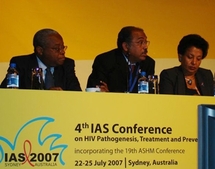
"People shouldn't see the epidemic as only a problem, like we have been doing up to now," Sidibe told AFP in an interview on a visit to Senegal three months after taking up his post.
"We have to ... try and show that the epidemic can be an opportunity. A political opportunity to trigger profound changes in society, to talk about difficult issues like sex education, homophobia and human rights issues in general like the position of women in society," Sidibe argued.
HIV/AIDS could be "an entry point to discuss these issues and bring about changes in legislation".
The financial resources available to combat HIV/AIDS can also help strengthen healthcare especially in Africa, the world's poorest continent and the most affected by the epidemic.
"Of the 25 billion dollars in aid estimated to be needed to finance universal access (to treatment for HIV/AIDS), nine billion dollars (6.8 billion euros) is earmarked for overhauling health care systems," he stressed.
"This is an opportunity if we make sure we don't isolate it like we have done for the past 20 years ... and only use it for HIV/AIDS," the 57-year-old who worked for the UN's children's organisation UNICEF for 14 years before joining UNAIDS in 2001, explained.
"It could be a way to transform and rebuild society around the social needs of the population," Sidibe added.
"I see UNAIDS as a political agent which has to demand change, I don't see it as UNICEF or the World Health Organisation which very clearly outlined programs."
"UNAIDS has to be the voice for the voiceless, it should have political courage," according to Sidibe. The organisation recently criticised the pope's stance on the use of condoms.
Ahead of a trip to Africa pope Benedict XVI said AIDS "cannot be overcome through the distribution of condoms, which even aggravates the problems."
The comments have sparked international criticism from governments, UN agencies and health groups.
During a meeting with Senegalese president Abdoulaye Wade, Sidibe said he had also raised the appeals case of nine men convicted to eight years in prison for homosexual acts.
"Universal access to care, treatment and prevention is my number one priority. The money is essential, we need to continue to mobilise resources and redouble our efforts to make sure the Global Fund is totally financed."
The Global Fund, set up to fight AIDS, malaria and tuberculosis in 2002, is still seeking 4 billion dollars in funding for the 2008-2010 period.
But rather than launch another call on international donors who are reeling from the effects of the global economic crisis Sidibe said UNAIDS should also think about how to optimize the partnership.
"We should make sure that we can demand a certain performance, with an accountability, and obligation to produce results" in the fight against HIV/AIDS, he stressed.
--------------------------------------------------------------------------------------------------
"We have to ... try and show that the epidemic can be an opportunity. A political opportunity to trigger profound changes in society, to talk about difficult issues like sex education, homophobia and human rights issues in general like the position of women in society," Sidibe argued.
HIV/AIDS could be "an entry point to discuss these issues and bring about changes in legislation".
The financial resources available to combat HIV/AIDS can also help strengthen healthcare especially in Africa, the world's poorest continent and the most affected by the epidemic.
"Of the 25 billion dollars in aid estimated to be needed to finance universal access (to treatment for HIV/AIDS), nine billion dollars (6.8 billion euros) is earmarked for overhauling health care systems," he stressed.
"This is an opportunity if we make sure we don't isolate it like we have done for the past 20 years ... and only use it for HIV/AIDS," the 57-year-old who worked for the UN's children's organisation UNICEF for 14 years before joining UNAIDS in 2001, explained.
"It could be a way to transform and rebuild society around the social needs of the population," Sidibe added.
"I see UNAIDS as a political agent which has to demand change, I don't see it as UNICEF or the World Health Organisation which very clearly outlined programs."
"UNAIDS has to be the voice for the voiceless, it should have political courage," according to Sidibe. The organisation recently criticised the pope's stance on the use of condoms.
Ahead of a trip to Africa pope Benedict XVI said AIDS "cannot be overcome through the distribution of condoms, which even aggravates the problems."
The comments have sparked international criticism from governments, UN agencies and health groups.
During a meeting with Senegalese president Abdoulaye Wade, Sidibe said he had also raised the appeals case of nine men convicted to eight years in prison for homosexual acts.
"Universal access to care, treatment and prevention is my number one priority. The money is essential, we need to continue to mobilise resources and redouble our efforts to make sure the Global Fund is totally financed."
The Global Fund, set up to fight AIDS, malaria and tuberculosis in 2002, is still seeking 4 billion dollars in funding for the 2008-2010 period.
But rather than launch another call on international donors who are reeling from the effects of the global economic crisis Sidibe said UNAIDS should also think about how to optimize the partnership.
"We should make sure that we can demand a certain performance, with an accountability, and obligation to produce results" in the fight against HIV/AIDS, he stressed.
--------------------------------------------------------------------------------------------------









 Home
Home Politics
Politics









